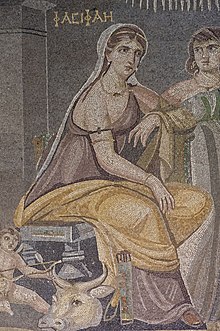In Greek mythology, Pasiphaë (/pəˈsɪfiiː/;[1] Greek: Πασιφάη Pasipháē, "wide-shining" derived from πᾶς pas "all, for all, of all" and φάος/φῶς phaos/phos "light")[2] was a queen of Crete.
Family[edit]
Pasiphaë was the daughter of Perse (one of the Oceanids[3]) and Helios, the god of the Sun.[4] She was thus the sister of Aeëtes, Circe and Perses of Colchis. In some accounts, Pasiphaë's mother was identified as the island-nymph Crete herself.[5][6] Like her doublet Europa, the consort of Zeus, her origins were in the East, in her case at the earliest-known Kartvelian-speaking polity of Colchis (Egrisi (Georgian: ეგრისი, now in western Georgia[7][8][9][10]); she was the sister of Circe, Aeëtes and Perses of Colchis, and she was given in marriage to King Minos of Crete. With Minos, she was the mother of Acacallis, Ariadne, Androgeus, Glaucus, Deucalion, Phaedra, Xenodice, and Catreus. She was also the mother of "star-like" Asterion, called the Minotaur.
https://en.wikipedia.org/wiki/Pasiphaë
Literary Minos[edit]
Minos appears in Greek literature as the king of Knossos as early as Homer's Iliad and Odyssey.[17] Thucydidestells us Minos was the most ancient man known to build a navy.[18] He reigned over Crete and the islands of the Aegean Sea three generations before the Trojan War. He lived at Knossos for periods of nine years, where he received instruction from Zeus in the legislation which he gave to the island. He was the author of the Cretan constitution and the founder of its naval supremacy.[18][19]
On the Athenian stage Minos is a cruel tyrant,[20] the heartless exactor of the tribute of Athenian youths to feed to the Minotaur; in revenge for the death of his son Androgeus during a riot (see Theseus).[21]
In Greek mythology, Minos (/ˈmaɪnɒs, -nəs/; Greek: Μίνως, Ancient: [mǐːnɔːs] Modern: [ˈminos]) was a King of Crete, son of Zeus and Europa. Every nine years, he made King Aegeus pick seven young boys and seven young girls[1] to be sent to Daedalus's creation, the labyrinth, to be eaten by the Minotaur. After his death, Minos became a judge of the dead in the underworld.
The Minoan civilization of Crete was named after him by the archaeologist Sir Arthur Evans.
https://en.wikipedia.org/wiki/Minos



No comments:
Post a Comment